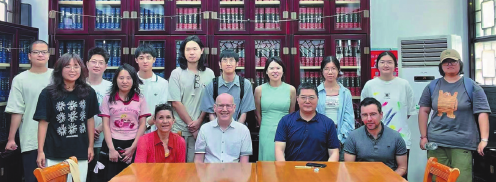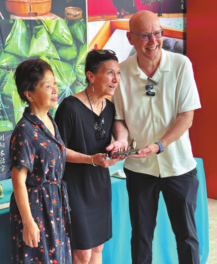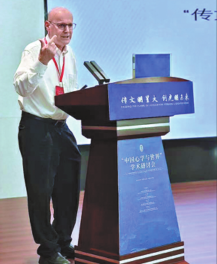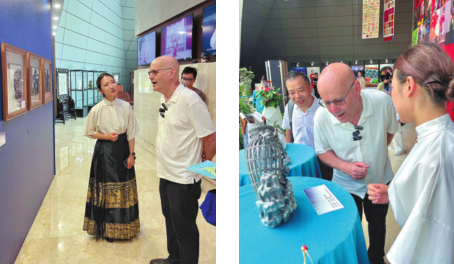US professor shows a class act
Academic reveals his passionate interest in China and stresses importance of heritage, Yang Feiyue reports in Changsha.

Under the midday sun at the main celebration venue of China's Cultural and Natural Heritage Day, Peter Ditmanson, in shaded glasses, took the stage — his lenses darkened by the glare, though they couldn't quite hide the faint smile on his face.
Speaking in gentle, fluent Mandarin, the American historian and professor at Yuelu Academy, Central China's Hunan University, was the only international guest to address a large audience at the celebratory event in the provincial capital Changsha on June 14.
Ditmanson shared a story that stretched back 1,000 years — a tale of debate, scholarship, and the enduring spirit of one of China's oldest academies.
For more than six years, the man in his 60s has made Yuelu Academy his intellectual home. He has translated historical documents, championed digital humanities initiatives, and brought new light to old traditions.
"Cultural heritage is a shared treasure of humanity," he said to the crowd.
Sitting at the foot of Yuelu Mountain in Changsha, Yuelu Academy was founded in the Northern Song Dynasty (960-1127). Over time, it was expanded to include key functions such as lectures, book collections, and ceremonial offerings.
Despite the rise and fall of dynasties and having been destroyed and rebuilt several times, the academy has preserved its traditions and scholarly legacy for over 1,000 years. Today, it remains the only university-affiliated institution (under Hunan University) in China that continues to bear the name of a traditional academy, offering a full spectrum of programs from undergraduate to postdoctoral levels.
Ditmanson regards protection of the ancient academy as a case in point for the heritage day.
"It reminds us of the importance in safeguarding the academy and encouraging its global engagement," he says.
Years of teaching have convinced Ditmanson that Yuelu Academy is not merely an ancient institution but a living symbol of China's openness to the world.
What first impressed him were the spirited philosophical debates between two great Confucian thinkers of the Southern Song Dynasty (1127-1279) that elevated the academy's reputation.
The renowned Neo-Confucian scholar Zhu Xi visited Yuelu Academy and engaged in a long spirited philosophical debate with Zhang Shi, then head of teaching at the academy.
As he spent the past six years teaching at the academy, Ditmanson has found that it "remains a place that welcomes scholars from diverse backgrounds and regions, and continues to uphold the value of open dialogue and debate".
"I believe this spirit of openness and inclusiveness is one of the key reasons why the academy has remained so dynamic and relevant across the centuries. It is also what makes me feel truly at home here."
Ditmanson's family's connection with China runs deep, tracing back generations.
His paternal grandparents came from the United States, and his maternal grandparents from Australia.
"They arrived in China in the early 20th century, dedicating themselves to social welfare and relief work. Amid the turmoil of war, my parents met and bonded over a shared commitment to compassion and service," he recounts.
From 1945 to 1948, his father worked for the United Nations Relief and Rehabilitation Administration.
"After World War II, he conducted fieldwork in Zhangjiakou, Hebei province, seeking to learn more about conditions in northern China. As a physician, he continually refined his skills, striving to provide accessible, effective medical care to those in need. Their stories formed the earliest impressions I had of China," he says.
Ditmanson was born in China and lived in the country until he was 8 years old, when he moved back to the US.
"I forgot how to speak putonghua (Mandarin) and found that I didn't know much about my cultural heritage," he recalls growing up.
Driven by a personal desire to reconnect with his roots, he began studying Chinese language and literature at the University of Minnesota, where he earned a Bachelor of Arts and a Master of Arts. He later pursued Chinese history at Harvard University, receiving a PhD with a primary research focus on the Ming Dynasty (1368-1644).
The Ming period appealed to him as a time undergoing rapid economic, cultural and social changes, globalization pressures, urbanization and shifts in communication, he says.
"There are echoes of our modern world in theirs," he notes.
When he was working as a research fellow in Taipei, he was invited to give a lecture at Yuelu Academy in 2017.
"At the time, I knew little about the academy's history. But what left a lasting mark on me was a traditional Dragon Boat Festival ceremony," he says, adding that the moment revealed to him that the academy is not only a place for academic pursuit and talent cultivation but a living space of tradition.
The open academic atmosphere and friendly student-faculty relations also left a strong impression on him, which led him to accept a full-time teaching offer in 2018.
He has made a point of drawing parallels between China in the Ming Dynasty and other early modern states.
"I try to help students understand that Chinese history is part of world history. I encourage comparative thinking — for instance, if we're studying the Ming Dynasty, we also look at what was happening in Europe, the Ottoman Empire, or England during the same period," he explains.
Among the overlooked aspects of Chinese history, two themes stand out to Ditmanson.
First, there's the remarkable diversity within the Chinese culture and society during that period.
"Linguistic, cultural and social differences are a very important part of China's rich history that we need to understand better," he says.
Ditmanson is also captivated by what he calls a "revolution in information and communication" that unfolded in the late Ming era.
"The printing (industry) began to have a more significant impact on all aspects of Chinese society," he notes.
As Ditmanson has interacted with more Chinese scholars in his field, he has developed deep admiration for their rigorous textual analysis and internal historical dynamics.
"I work with many different scholars, especially younger ones, and each has a unique perspective and scholarly approach," he observes.
Beyond his teaching duties, Ditmanson has led a team in translating key documents such as the academic regulations and the historical records of Yuelu Academy, with the goal of making this historic institution more accessible to international audiences.
The hardest part of the work, he says, has been conveying the underlying feelings and meanings that are deeply embedded in traditional Chinese culture.
Yu Chuming, a second-year PhD candidate in Chinese history at Yuelu Academy, says Ditmanson first impressed him as "graceful and composed, yet full of vitality".
As he deepens academic exchanges with Ditmanson, the 28-year-old finds his professor has offered him "a new way of seeing".
"He brings in perspectives from Western Sinology that are often missing from our traditional training, and learning directly from a Western-trained historian who lives and breathes Chinese culture adds incredible depth," Yu says.
Yu particularly appreciates Ditmanson's emphasis on making research meaningful and engaging. "He always reminds me: an academic paper shouldn't just be written for its own sake — it should attract interest, spark thought, and reach people. Otherwise, even solid research risks becoming irrelevant," he adds.
Comparing Western and Chinese historiographical traditions, Yu observes that Western scholars often start from a small, specific point and build outward to reveal broad patterns, while Chinese scholars may begin with larger frameworks.
He believes that Ditmanson skillfully balances both approaches.
Last year, Ditmanson received the 2024 Chinese Government Friendship Award, a recognition he says has reaffirmed "China's warmth, openness, and commitment to cultural exchange". It is also, he notes, an award that recognizes the efforts and spirit of Yuelu Academy.
Given today's relations between China and the West, Ditmanson says it's crucial to build personal and academic connections.
"Whether you're a teacher in China, America, or Europe, you're still pursuing knowledge, still trying to teach. I hope visitors leave with the understanding that — at heart — we're all the same," he says.



































